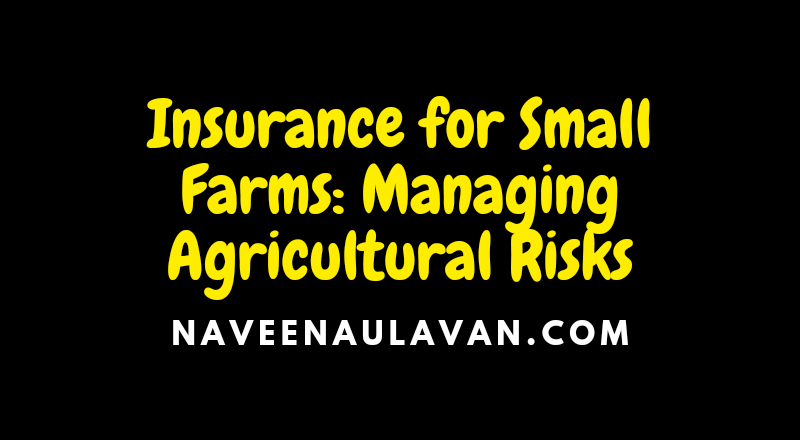Agriculture is a vital industry that plays a crucial role in the economy and food production. However farming is not without risks. Small farmers in particular face numerous challenges that can jeopardize their livelihoods such as natural disasters crop failures and price fluctuations. To mitigate these risks insurance has become an essential tool for small farming operations. This article will explore the importance of insurance for small farms and how it helps in managing agricultural risks.
The Importance of Insurance for Small Farms
1. Financial Protection
Crop failure livestock diseases and other unforeseen events can significantly impact small farmers’ incomes. Insurance provides financial protection by compensating for the loss of crops livestock or equipment. This protection helps farmers recover from these setbacks and continue their operations ensuring their economic stability.
2. Stability for Rural Communities
Small farms often serve as the backbone of many rural communities. When farms suffer losses the effects often reverberate through the entire community. Insurance helps stabilize these communities by providing a safety net for farmers. This stability in turn supports local businesses and jobs that rely on agricultural activity.
3. Access to Credit
Access to credit is essential for farmers to invest in their operations modernize equipment or purchase inputs. Lenders are more willing to provide loans to farmers who have insurance coverage as it reduces the potential risks. Insurance acts as a guarantee for lenders making it easier for small farmers to access credit and expand their businesses.
4. Risk Management
Insurance is a fundamental component of risk management for small farms. By transferring risks to insurance companies farmers can focus on their farming activities without constant worry about potential losses. Insurance policies provide coverage for various risks such as property damage crop failures livestock mortality and liability claims. With proper coverage farmers can effectively manage and mitigate risks that are beyond their control.
5. Compliance with Government Requirements
In some countries having insurance coverage is a legal requirement for farmers. Governments may mandate insurance as a measure to protect farmers and ensure agricultural stability. By complying with these requirements small farms can avoid penalties and benefit from government support programs and subsidies.
Types of Insurance for Small Farms
1. Crop Insurance
Crop insurance is one of the most common forms of coverage for farmers. It protects against the loss of crops due to natural disasters pests or diseases. Crop insurance policies typically compensate farmers for the lost yield or its market value. This type of insurance is particularly important for small farmers who heavily rely on their harvest for income.
2. Livestock Insurance
Livestock insurance provides coverage for the loss of animals due to accidents diseases theft or natural disasters. Small farmers who raise livestock can benefit from this type of insurance to protect their investments and maintain their herds’ health.
3. Property Insurance
Property insurance covers damage or loss of farm buildings machinery equipment and other physical assets. It provides financial compensation to farmers for repair or replacement costs in case of fire storms vandalism or theft. Property insurance is crucial for small farmers who often lack the resources to recover from such losses independently.
4. Liability Insurance
Liability insurance protects farmers from potential lawsuits or claims filed by third parties such as visitors to the farm or neighboring landowners. It covers bodily injury property damage or legal expenses arising from accidents or incidents that occur on the farm. Liability insurance gives small farmers peace of mind and safeguards their financial stability in case of unexpected legal liabilities.
5. Weather-Based Index Insurance
Weather-based index insurance is a unique type of coverage that relies on specific weather parameters rather than actual losses to determine compensation. It is particularly useful for small farmers who face unstable weather patterns and unpredictable climate conditions. This insurance provides faster and more transparent payouts based on predefined weather triggers allowing farmers to recover quickly from weather-related losses.
Conclusion
Insurance plays a vital role in managing agricultural risks for small farmers. It offers financial protection stability for rural communities access to credit and compliance with government requirements. By choosing the right insurance coverage small farmers can effectively manage risks recover from setbacks and ensure the sustainability of their farming operations. As the agricultural sector continues to face uncertainties insurance remains a crucial tool for small farmers to navigate these challenges and protect their livelihoods.
